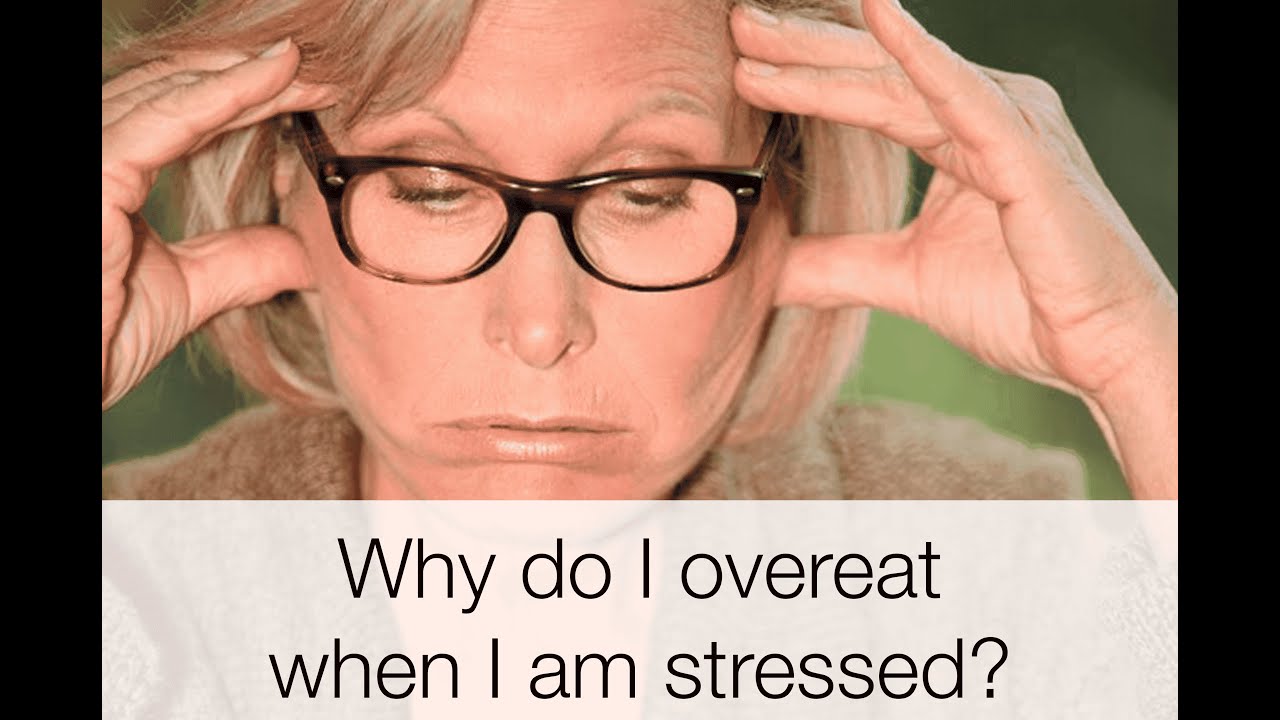Mindful Eating question from Nora: Why do I overeat when I’m stressed? Even though I no longer binge eat, stressful events almost always lead to overeating. It’s frustrating because I want my eating to be stable, regardless of life’s circumstances.
Watch this video about why stress leads to overeating, and what you can do about it.
#AskAmIHungry Video Transcript: Why do I overeat when I’m stressed?
Nora, you are not alone! Stress is a very common trigger for eating, because eating provides temporary distraction or comfort.
It’s important to realize that eating is simply an attempt to feel better, so let me first say that there is no need to add to your stress by beating yourself or feeling guilty for trying to take care of yourself!
What is stress anyway?
So why do you overeat when stressed? Stress is your body’s response to an event or situation that feels threatening, overwhelming, or harmful—whether real or perceived.
In fact, stress is not necessarily bad. Stress can:
- Protect you from harm
- Help you react when threatened
- Help you adapt to changing circumstances
- Motivate you to do your best
- Add excitement to your life
However, when you experience excessive or chronic stress, or don’t yet have the skills to cope with it, stress can take a toll on you, physically and emotionally.
Fight, Flight, or Freeze
Stress results from your body’s instinct to protect itself, called the “fight, flight, or freeze” response. Such reactions were useful when your ancestors frequently faced life and death situations. Today, few situations are life and death, yet your body still reacts as if they were.
When you’re faced with a challenge, whether it’s true physical danger, a deadline, or a traffic jam, the hypothalamus sends impulses through the endocrine (hormone) and autonomic nervous systems. These signals produce a surge of energy by making various organs dump stress chemicals—cortisol and adrenaline—into the bloodstream. This boosts your heart rate and blood pressure, dilates your blood vessels, and releases glucose into your blood stream.
This response is intended to mobilize you for quick action. However, when the response is out of proportion to the actual threat, or when mobilization isn’t possible or helpful, you’ll experience dis-stress.
This type of stress can wear down your body, exhausting you, and weakening your defense against disease (dis-ease). As a result, you may experience gastrointestinal problems, headaches, insomnia, anxiety, depression, high blood pressure, and heart disease. It can also lead to distress habits like overeating, smoking, drinking, or drug use.
When you’re experiencing stress, your impulse might be to power through, freak out, or stick your head in the sand. But busyness, overworking, smoking, eating to the point of discomfort, drinking alcohol to excess, isolating, and taking frustration out on others usually perpetuates the stress reaction.
Manage stress before it manages you!
Since a stress-free life isn’t possible, or even desirable, it’s important to learn to manage stress, before it manages you.
First, remember that it’s fine to choose to eat even if you aren’t hungry—but choose, don’t “cheat”! Feeling that you’re cheating only adds to your stress!
Of course, the problem with eating is that the source of your stress doesn’t really go away! So, for longer lasting relief, here are other ways to reduce your stress:
Pause and focus: Instead of trying to escape what you’re experiencing, pause and take a few deep breaths. Do a slow head to toe scan and become aware of what you’re thinking, feeling, how your body is reacting, and what you’re doing as a result—without judging it. Just observe what’s there. This will help you understand why you want to overeat when stressed?
Put things in perspective: When you’re feeling overwhelmed, stop and ask, “What difference will this make one week, or even one year, from now?” and “Is this really important to me?”
Pause and breathe: If the situation won’t have any long-term consequences or doesn’t hold true importance in your life, it deserves less of your energy. If you notice you’re in an “over-reactive mode,” pause and breathe.
Change your thoughts: Thoughts about the past or the future are often at the root of stress—but the only thing you can control is what you focus on right now. When you view something as manageable or even tolerable, your body will remain alert but not alarmed.
Take charge – if possible: If you notice that you’re feeling out of control (a common source of stress), ask yourself, “Can I change this? If so, how?” If you can take some action to correct, improve, or remove yourself from a situation, your stress will be reduced considerably.
Accept: When a situation is beyond your control, use self-compassion and respect your personal strengths and limitations. When you accept the situation as it is in this moment and just allow it to be, you won’t compound the stress response by resisting it or overreacting to it.
Acknowledge your power to choose: Remember, you can choose to change jobs, discontinue your involvement with certain people, or limit your activities. You also have choices about how you perceive and react to the circumstances, events, and people in your life.
Take a baby step in the direction you want to go. Empower yourself by acknowledging your ability to choose – even if your choice is to just breathe through it.
This article is updated from a previous version.
If you enjoyed this article, here are three more to help you:
Mindless and emotional eating during quarantine
What to Do Instead of Stress Eating: Stress Management 102
Taking My Own Advice about Stress


